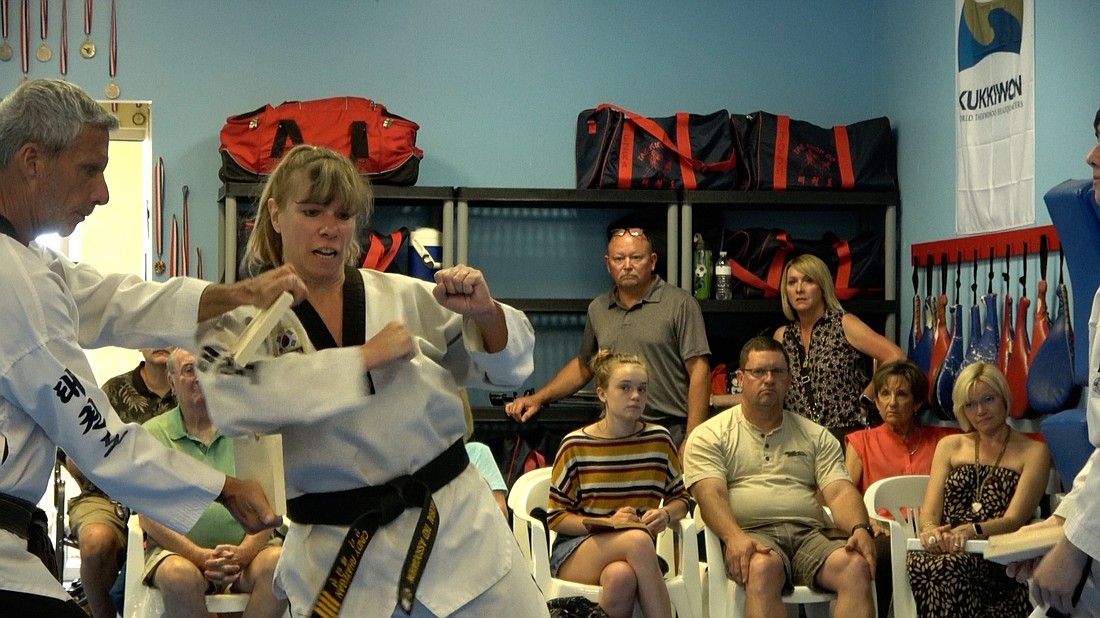- May 10, 2025
-
-
Loading

Loading

Four hours after starting the physical test May 5 to become a fifth-degree black belt, Lakewood Ranch’s Cindy Rhategan took a bow.
After completing 43 necessary “forms,” or series of movements in a pattern designed to defend against multiple attackers, required of her on May 5, Rhategan was finally done.
Lakewood Ranch Taekwondo Academy's Craig Balliette, a grandmaster, notified Rhategan she had passed.
After 18 years of training, Rhategan had become a fifth-degree dan (or black belt), meaning she earned the right to be called a “master.”
A June 21 ceremony completed the process as Rhategan posted for photos with her certificates after receiving final confirmation from multiple associations of her accomplishment.
“It was very nice and overwhelming,” Rhategan said of obtaining . “It feels good to have people be excited for me. That’s what I love. There’s an entire black belt family.”
Balliette has been an instructor for 40 years, and he said he’s only awarded the level to four others — and three of those were people who already owned their own martial arts schools. For a student to accomplish it is a rare feat, he said. Balliette is a strict follower of the art, and runs his academy to-the-letter as a result. Other academies will offer first-degree black belts after two years, sometimes less, he said. At his academy, it takes five.
“To do this takes time,” Balliette said. “It takes dedication. For that reason, few people have the ability to make it.”
Being a master, Rhategan said, means upholding the standards. She understands what the black belt itself means, beginning anew. In taekwondo, holding a black belt is not considered mastery, but another step in learning. This is how Rhategan, ever curious, approaches life. She’s never done soaking up information.
As skilled as Rhategan is at taekwondo, it is but one facet of her lifelong dedication to self-preservation and defense. She studies jiu jitsu at Goshen Jiu Jitsu of Lakewood Ranch, where she’s a third-degree black belt after nine years of training. She participates in National Rifle Association safety classes. She’s a divemaster at her husband Sean Rhategan’s diving company, Scuba Rhat, and teaches CPR to rescue divers. She also teaches self-defense privately, mainly to young women, through C&S Self-Defense Training Services.
“Women are perceived to be weak,” Rhategan said. “Even knowing a little bit about self-defense will put off an attacker.”
She has never been attacked, but while vacationing in Dominica with friends, the group was followed by a man asking for money. He put his hand on Rhagetan’s shoulder and she spun 180 degrees, hands raised, ready to combat whatever the man had planned for her. The man, startled, backed away and left the area. That’s the outcome she hoped for, she said. The goal of self-defense isn’t to win fights, but to quell situations where fights might occur.
The best advice Rhagetan gives often is the most simple. Chokeholds, for example, are easily broken if the victim uses gravity to their advantage and pounds downward. Usually, victims try to power upward through the hold, and that doesn’t work, she said.
She’s so skilled, Sean Rhategan refuses to train with her (“His coordination is not there,” she said laughing). The couple have a joke where he grabs a pillow as a shield whenever the topic is broached.
She began her martial arts career as an adult, when her daughter Justine Rhategan took a class with Balliette, and she wants everyone to know its never too late to learn self-defense, as you’ll never know when you’ll need it.
“It’s good for any age,” Rhategan said. “Even for older people, there’s Tai Chi. It’s not just the physical components, but the mental. You push through pain. When you focus your energy, you can learn a lot. The physical side is great, but the mental side is what makes it art.”